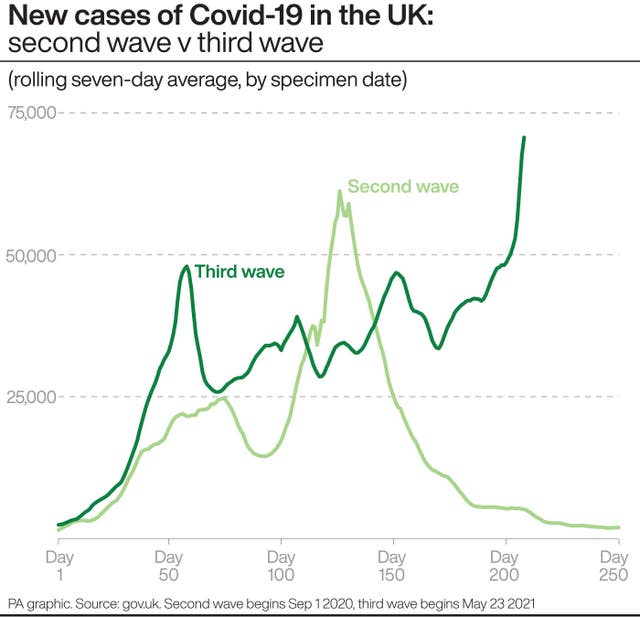
A dose of the Moderna vaccine used in the UK’s booster programme increases neutralising antibodies against Omicron around 37-fold, the firm has announced.
Moderna said its preliminary data looking at Omicron was “reassuring”, though it will continue to develop a jab specific to the variant.
The data showed that 50mcg of the Moderna vaccine (the half-dose recommended by the Joint Committee on Vaccination and Immunisation for the UK’s booster programme) increased neutralising antibody levels against Omicron approximately 37-fold compared to pre-boost levels, while a full dose increased it 83-fold.
READ MORE: Pfizer jab protects 70% against hospital admission for Omicron
The JCVI in the UK did not recommend a full dose due to the increased risk of side-effects and after a UK study found a half dose still provided very good protection.
 (PA Graphics)
(PA Graphics)
The US Food and Drug Administration also recommends that Moderna is given as a half dose booster.
The new data included blood samples from 20 people given a Moderna boost of 50mcg or 100mcg, with the results analysed at the National Institute of Allergy and Infectious Diseases’ (NIAID) Vaccine Research Centre at Duke University Medical Centre.
READ MORE: New Covid symptom that could be affecting your sleep
All groups had low neutralising antibody levels to Omicron before receiving a booster and were looked at again 29 days after the booster jab.
Antibodies are not the only part of the immune system to tackle coronavirus.
Experts believe that T cell immunity, which is harder to measure, also plays a key role in preventing severe disease.



Why are you making commenting on The Herald only available to subscribers?
It should have been a safe space for informed debate, somewhere for readers to discuss issues around the biggest stories of the day, but all too often the below the line comments on most websites have become bogged down by off-topic discussions and abuse.
heraldscotland.com is tackling this problem by allowing only subscribers to comment.
We are doing this to improve the experience for our loyal readers and we believe it will reduce the ability of trolls and troublemakers, who occasionally find their way onto our site, to abuse our journalists and readers. We also hope it will help the comments section fulfil its promise as a part of Scotland's conversation with itself.
We are lucky at The Herald. We are read by an informed, educated readership who can add their knowledge and insights to our stories.
That is invaluable.
We are making the subscriber-only change to support our valued readers, who tell us they don't want the site cluttered up with irrelevant comments, untruths and abuse.
In the past, the journalist’s job was to collect and distribute information to the audience. Technology means that readers can shape a discussion. We look forward to hearing from you on heraldscotland.com
Comments & Moderation
Readers’ comments: You are personally liable for the content of any comments you upload to this website, so please act responsibly. We do not pre-moderate or monitor readers’ comments appearing on our websites, but we do post-moderate in response to complaints we receive or otherwise when a potential problem comes to our attention. You can make a complaint by using the ‘report this post’ link . We may then apply our discretion under the user terms to amend or delete comments.
Post moderation is undertaken full-time 9am-6pm on weekdays, and on a part-time basis outwith those hours.
Read the rules hereLast Updated:
Report this comment Cancel